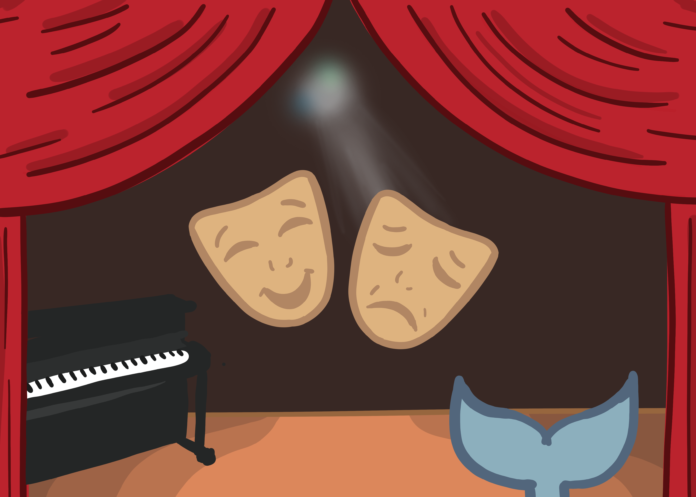If you’re looking for something new, consider this composer’s unconventional musical theatre discography
By ADHITHI ANJALI — arts@theaggie.org
The idea of musical theatre alone summons to mind the weird: long-winded solos, absurd dancing and even more absurd sets. One of the most famous names in theatre, Andrew Lloyd Webber, has certainly set the tone for this, creating adaptations of a poetry collection about cats trying to get to the afterlife (“Cats”) and a musical about a steam engine train trying to prove itself (“Starlight Express”). So, the “weird” in the world of musicals is a welcome — if not aspired to — descriptor.
The composer highlighted here is not a stranger to atypical stories or mainstream acclaim. Dave Malloy is best known for “Natasha, Pierre, and the Great Comet,” an adaptation of a small segment of Leon Tolstoy’s distinguished 1869 novel, “War and Peace.” It won two Tony Awards for Best Scenic and Lighting Design in a Musical in 2016, but is overall widely perceived as a “flop” on Broadway.
Its spectacular fall and Broadway controversy is a multi-faceted one, bringing to light issues of commercial interests of Broadway as an industry and how this clashes with efforts to protect and offer roles for diverse actors. Overall, “Great Comet” was not likely to last and draw in a majority tourist audience — after all, nearly 63% of Broadway ticket sales are from tourists. Understandably, this demographic is hesitant to spend an exorbitant amount of money on a musical that has not won more prominent Tony Awards, such as those for Best Musical or Best Score.
However, I believe that Malloy’s musicals are examples of how we place too much trust in Broadway as an institution to tell us what amount of weirdness is permissible and marketable. Instead, we can think about some of his other musicals which revel in unapologetic experimentation and (in the best way possible) nonsense that reimagines what musicals aim to do.
Though he has written 19 musicals, his most prominent aside from “Great Comet” are “Ghost Quartet,” “Preludes” and “Octet.” Malloy’s unique style of lyricism shines through each of these, forgoing a strict structure to instead sprawl along the composition. There’s a sense that emotion barrels through the score, more intense than any demanding form or rules, but it is controlled in a mélange of classical music and electronic synth.
For example, the opening number of “Preludes,” Malloy’s musical about Russian composer Sergei Rachmaninoff’s hypnotism therapy after the failed premiere of his Symphony No. 1 in D minor, exemplifies Malloy’s approach to his songs. The transitions between singing and talking heighten Rachmaninoff’s turmoil and separation from reality. This is backed by a piano composition that grows more dissonant and sporadic as it is overlaid by the synthesized sound of strings.
The rest of the musical continues to play with classical sounds, including some of Rachmanioff’s work, but Malloy spins it into psychedelic, eccentric tunes that reflect Rachmanioff’s mind as he is brought to the edge through a phantasmagoria of bizarre and anachronistic hallucinations.
Passively listening to Malloy is a difficult task, even when he has a song that follows a common form. For example, “Starchild,” a song from “Ghost Quartet,” may have a simple alternating verse-chorus structure, but it stuns with its lyrics and Brittain Ashford’s smoky voice.
Among this selection of musicals, “Ghost Quartet” stands out for its writing. It’s a story that moves nowhere, across time and space, and in constant circles. Loosely put, it is a ghost story that draws from seven centuries of ghost stories, among them Edgar Allen Poe’s “The Fall of the House of Usher” and “Arabian Nights.”
Finally, “Octet” is one of Malloy’s most recent musicals, premiering in 2019. It follows an internet-addiction support group, exploring how technology mediates our relationships with people and how we relate to technology itself. It is largely a cappella, with its eight-person cast providing beautiful harmonies and even more intriguing disharmonies. “Monster,” a number at the show’s halfway mark, is wonderfully strange and heavy, choked with sinister and humorous lyrics that ultimately dissolve into uneasy repetition. “Octet” succeeds, overall, in presenting all the failures and sweet addictions of the online sphere in a surprising, non-condescending manner that so many other pieces fail to achieve.
None of these three made it on a Broadway stage, but they are inspiring in their creativity and astounding in their emotional resonance. Malloy’s concept and execution are tightly intertwined and his understanding of his craft is distinctly evident in the exuberant writing and composition. Check out his work for a surprising and unexpected ride that pushes your preconceived notions of just how weird musical theater can get.
Written by: Adhithi Anjali — arts@theaggie.org





